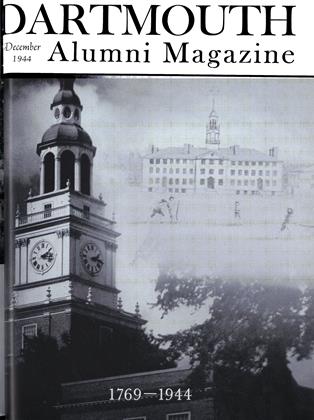Editor's Thoughts on Leaving Dartmouth for the Service Give Insight Into Reactions of Others to the Experience
THE SUMMER SEMESTER HAS ENDED, the winter semester come. The very moment I got off the bus on registration day. I feit a change. A sort of hollowness in the pit of my stomach warned me that the end of autumn had turned into the beginning of winter. It is true, the trees were no more leafless than when we left for the vacation ten days before, but then the leaves had just fallen, and the delicate black network of the branches was a welcome relief from the fullness of summer. Now they were a dead dead, if such is possible. The grass on the campus, which had not yet turned, seemed unnaturally green in contrast to the trees, so unnatural that I was tempted to wonder if something had gone wrong with "Nature's little plan."
Picture Baker Library silhouetted against a broken gray sky, a ghost of a wind tugging at the last few dead leaves clutching to the giant elms surrounding the campus. Then add to the image patches of pale yellow light coming out of the dorms as the afternoon darkens, and some boys lugging suitcases across the campus. This is Dartmouth in November.
Despite the gloom which hung over the campus, or perhaps because of it, there was an unusual amount of activity in the dormitories. There was an abundance of singing and whistling in the corridors, an excess of loud guffaws and "big hello's." I imagine "in the good old days," that after a vacation it was only a matter of finding out whereabouts on campus your friends were. Now the problem is to find out if they are here at all. If they are here at all, it is no trouble finding them with only three dorms open to the civilians.
Registration night found everyone waiting to enroll for the new semester, and waiting also to get their marks. Some were waiting anxiously at the door before they opened up. Others preferred to get there as late as possible. Some looked nervous, some looked greedy, and others looked rather smugly satisfied. But I believe that the majority, as in the days gone past, held the opinion that a "C" was a gentleman's grade. That "good old tradition," at least, has survived the war.
Soon the new semester began. The routine of classes saved the student body from any extended lament over the loss of summer. Baker bells rang us to and fro. Streams of people flowed across the campus paths between classes, scurrying along with their hands dug deep into coat pockets, each individual emitting a little puff of white as his warm breath met the cold clear air.
They seem so preoccupied that an outsider would think that they were oblivious to the surrounding countryside. And yet they are unconsciously storing up an image which will grow richer the longer they are away from Dartmouth.
Because I have been drafted, this must be of necessity my last article in this MAGAZINE. Even now, I do not know whether I am fit to represent the "undergraduate point of view." But at least I know something of what it means to leave college to go into the Service. And this has been the experience of most of the civilian students during the past five semesters.
Hanover is a funny place to leave. It pays no attention to you. With a noble indifference it lets you get on the bus, pay your fare, and vanish. No one looks up as you leave. People keep right on browsing around in Tanzi's store, keep on chatting in the street, and continue to walk home with their groceries, all unaware that a member of the student body is leaving College, going away.
As the last of Hanover vanished, my heart, which had been so excited at the first thought of going away, suddenly dropped to the bottom of my stomach. I wasn't quite sure where I had been for over a year, I wasn't quite sure where I was going. I wasn't even sure that I could convince a stranger that there was such a place as Dartmouth College in the middle of New Hampshire.
What about these students who are forced to leave after a few semesters? Was it worth it to come at all? They will come back to a different Dartmouth after the war. There will be fraternities, eating clubs, carnivals, all sorts of things they missed. They came at a time when these things were gone.
There are many who think that the lot of this, wartime student is like the plant nipped by a late frost, that he is lying dormant until an environment more conducive to normal growth appears. This is not so. He is pushing himself up despite the crusty earth, driving his roots deeper in search of warmth, and developing a strong independence.
ROBERT FROST '96 MEETS WITH STUDENTS in informal discussion during his annual visit to the College to conduct extracurricular work as Ticknor Fellow in the Humanities.
 View Full Issue
View Full Issue
More From This Issue
-
 Article
ArticleTHE FOUNDING FAITH
December 1944 By EARL CRANSTON '16, PHILLIPS PROFESSOR OF RELIGION -
 Article
ArticleTHE FIRST 175 YEARS
December 1944 -
 Lettter from the Editor
Lettter from the Editor'Round the Girdled Earth
December 1944 By H. F. W. -
 Class Notes
Class Notes1934
December 1944 By WILLIAM C. EMBRY -
 Class Notes
Class Notes1945
December 1944 By ARTHUR NICHOLS -
 Article
ArticleDARTMOUTH'S CHARTER
December 1944
Theodore R. Clark '47
Article
-
 Article
ArticleDARTMOUTH PROFESSORS TO TEACH AT COLUMBIA
May, 1923 -
 Article
ArticleBOSTON UNIVERSITY CLUB TO BREAK GROUND JUNE 1
April 1924 -
 Article
ArticleDARTMOUTH STUDENTS CONFUSE SENATORS AND BOLSHEVIKS
JANUARY, 1927 -
 Article
ArticleThe Many Gleasons of Dartmouth
SEPTEMBER 1988 -
 Article
ArticleTALK ABOUT ALUMNI OWNERSHIP!
FEBRUARY 1991 -
 Article
ArticleCollege Outing Clubs
APRIL 1994




